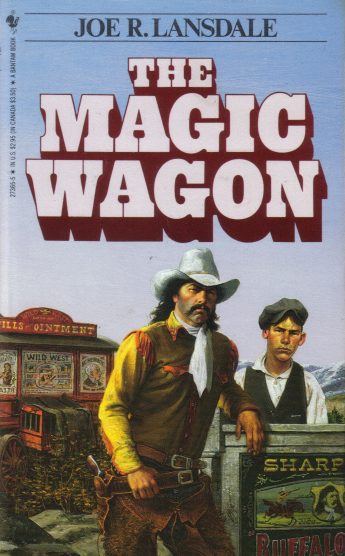 By JOE R. LANSDALE (Bantam; 1986)
By JOE R. LANSDALE (Bantam; 1986)
There’s never been a western novel quite like THE MAGIC WAGON, an insightful and touching account of Texas circa 1909 that incorporates elements of comedy and the supernatural. It’s a concoction only the inimitable Joe R. Lansdale could have pulled off, and he does so with considerable brio.
This was an early effort by Lansdale (credited in the author bio as “one of the most exciting young authors in America today”), and one of his personal favorites. These days it almost reads like a grab bag of many of Lansdale’s career-long touchstones: raunchy humor, shocking violence and B-movie inspired scares.
The Magic Wagon is a traveling medicine show featuring a wrestling ape named Rat-Toe, a gun-slinging corpse, apparently that of Wild Bill Hickok, and a tonic that promises to cure most any ailment. The wagon’s proprietors are a wise black man named Albert, an orphaned youngster named Buster, who narrates the tale, and Billy Bob Daniels, a slick trick-shooter and all-around asshole.
The latter has inherited his shooting talents from Wild Bill Hickok’s corpse, which was filched from a shady individual known as Nose Picker Chauncey and his partner, a strange Indian man. The latter claimed Wild Bill’s unmatched trick-shooting skills were spiritual in nature, and capable of passing into the hands of somebody else—and that somebody turns out to be Billy Bob.
Things come to a head in Mud Creek, Texas (the setting of many Lansdale tales), where Billy Bob grows increasingly arrogant and boastful about his talents. The corrupt townspeople egg him on, leading to much violent and dangerous behavior. Albert and Buster make a last-ditch effort to stop Billy Bob, in a final showdown that occurs, appropriately enough, on a dark and stormy night. Around this time Albert tells Buster the long-concealed truth about his relations with Billy Bob, which contains at least one bombshell revelation.
THE MAGIC WAGON is an extremely short book, almost a novella, but an uncommonly resonant one. It’s quite entertaining overall, and the funny bits really are funny: Buster’s reminiscence of Mule Slayer, a man driven mad by his flatulent mother-in-law, is simply one of the funniest damn things I’ve ever read. Yet the outrageousness is balanced with a hard-earned wisdom about life in the Old West, making this one of the very few books that truly has it all.
